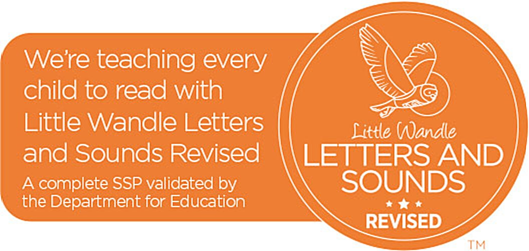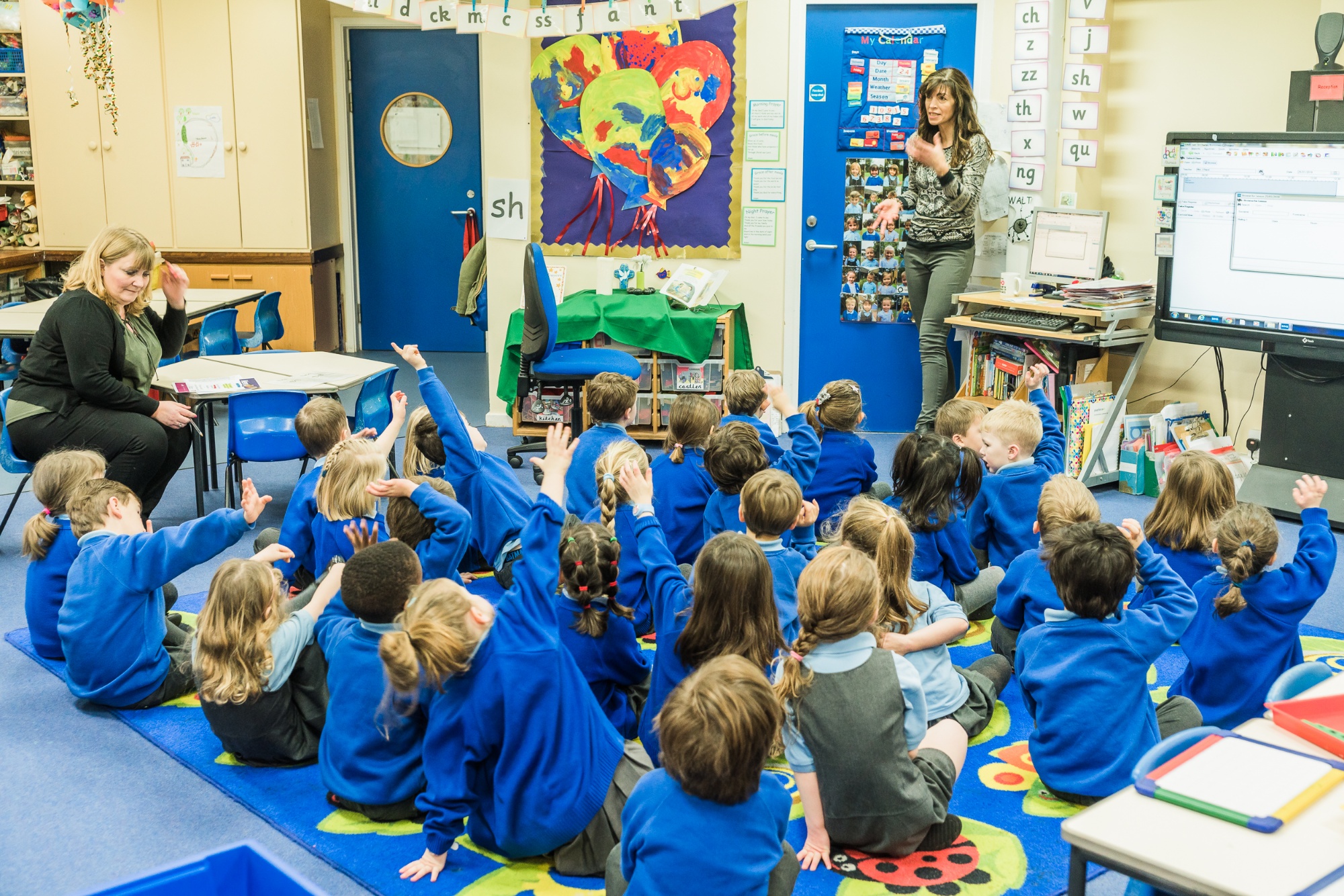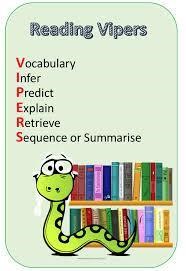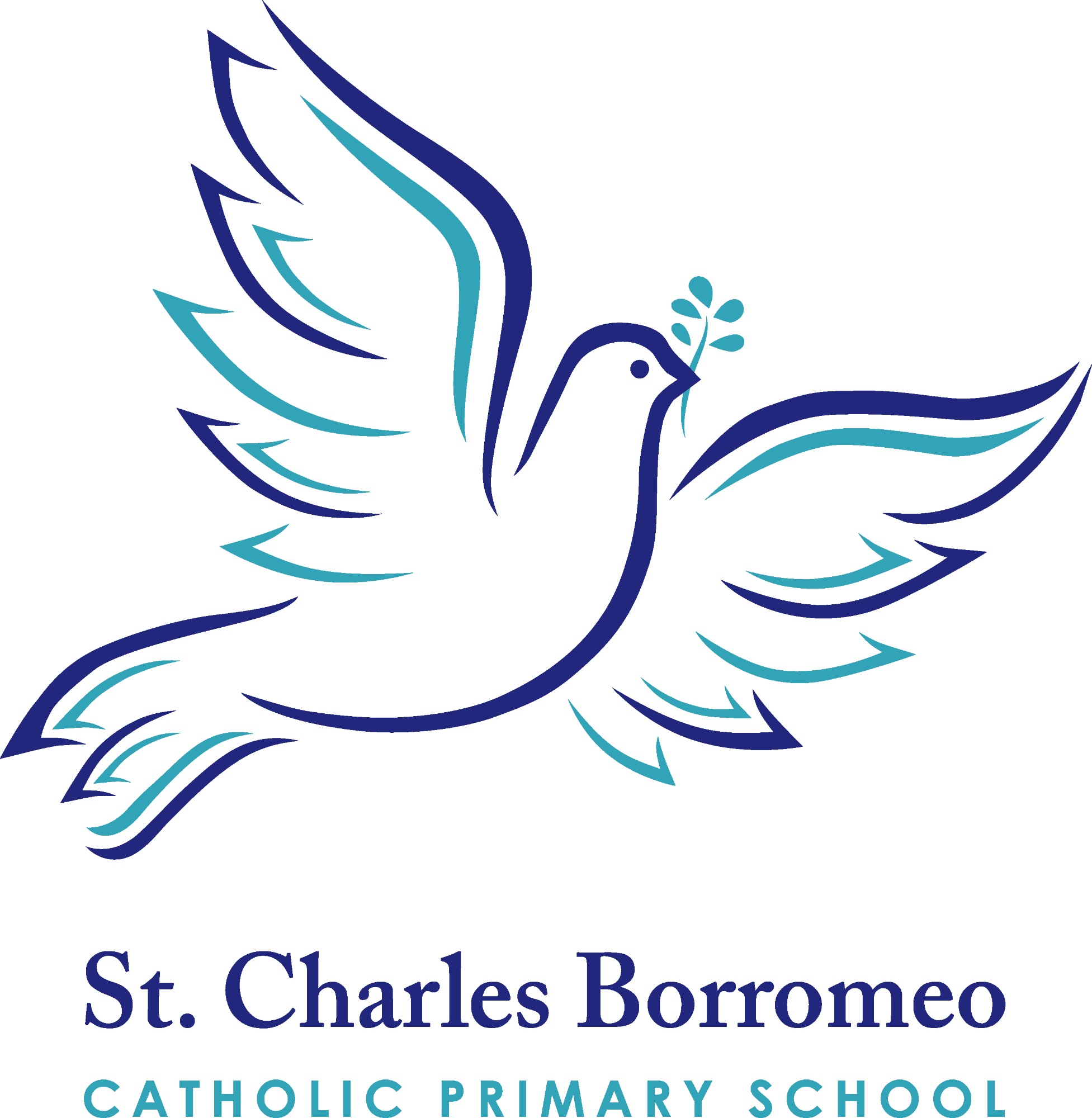Reading
Inspiring reading is our passion.
Through reading in particular, children have a chance to develop culturally, emotionally, intellectually, socially and spiritually. Literature especially plays a key role in such development. Reading also enables children both to acquire knowledge and to build on what they already know. We are committed to enabling our children to become confident, critical readers through our teaching and through their exposure to varied and challenging material. Stories, poetry, drama and media are used to encourage and motivate writing within the school.
Early Reading and Phonics

We teach early reading through the systematic, synthetic phonics programme Little Wandle Letters and Sounds Revised. The foundations of phonics begins in Nursery . Our Nursery curriculum supports language development, story reading, phonological awareness and oral blending . Right from the start of Reception children have a daily phonics lesson which follows the progression for Little Wandle Letters and Sounds and this continues in Year 1 to ensure children become fluent readers.
We teach phonics for 30 minutes a day. In Reception, we build from 2-minute lessons, with additional daily oral blending games, to the full-length lesson as quickly as possible. Each Friday, we review the week’s teaching to help children become fluent readers.
Children make a strong start in Reception: teaching begins in Week 2 of the Autumn term. We follow the Little Wandle Letters and Sounds Revised expectations of progress (please click here for the progression).
Week 2 of the Autumn term. We follow the Little Wandle Letters and Sounds Revised expectations of progress (please click here for the progression).
Four new phonemes and their corresponding graphemes are taught (GPCs) each week and they are then used in the final lesson of the week to review the week’s learning. Children will also learn tricky words during these sessions.
In the Autumn and Spring term, Reception learn phase 2 and phase 3 GPCs and then will spend the final term learning phase 4.
Year 1 begin the Autumn term with 3 weeks of revision of phases 2, 3 and 4 before learning phase 5, which will be completed by the end of the year. Year 2 children will begin the year by revisiting phase 5 and other previously taught phases to ensure all children are completely confident with applying these GPCs in both their reading and also their writing. (please see the overview here for what this progression looks like).
Half termly assessments take place through Reception and Year 1 to help inform future teaching and help identify children who have gaps in their phonic knowledge and need additional practice. Daily assessment of learning also takes place within the classroom so staff can quickly identify any children who are in danger of falling behind and provide the appropriate daily ‘Keep Up’ intervention.
Children in Reception and Year 1, read fully decodable books with an adult at least 3 times per week during our ‘Reading Practice’ sessions. These books are then taken home for children to build their reading fluency and showcase their developing skills and phonetic knowledge to their parents/carers. These 3 reading practice sessions each have a different focus; decoding, prosody and comprehension. In Reception and Year 1, the children read the Little Wandle Letters and Sounds Revised Big Cat fully decodable books. They also take-home extra books from various reading schemes and our school library to share with their family and develop a love of reading.
Once the children have completed the Little Wandle programme and their phonic decoding skills have become automatic and fluent reading is established, they will continue their reading journey reading books from the coloured reading bands and be regularly assessed using PM bench marking.
Reading from Year 2 – Year 6
At St Charles Borromeo, reading is prioritised to allow pupils to access the full curriculum offer. With a strong start in Reception and Year 1, pupils’ word reading and spelling reading become more accurate and automatic as fluency develops. Reading comprehension strategies focus on the learners’ understanding of written text. According to the EEF Teaching and Learning Toolkit, Reading comprehension strategies are high impact on average +6 months. Alongside phonics, it is a crucial component of early reading instruction. A wide range of strategies and approaches can be successful, but for many pupils they need to be taught explicitly and consistently. This is why we use Reading VIPERS.
VIPERS
Reading VIPERS is our way of supporting children with their reading comprehension skills. All children will be working on VIPERS during reading practice, whether it is reading as a class, in a small group, or one-to-one with an adult.
VIPERS is an acronym to aid the recall of the 6 reading domains as part of the UK’s reading curriculum. They are the key areas which we feel children need to know and understand in order to improve their comprehension of texts.
VIPERS stands for
Vocabulary
Inference
Prediction
Explanation
Retrieval
Sequence or Summarise
The 6 domains focus on the comprehension aspect of reading and not the mechanics: decoding, fluency, prosody etc. As such, VIPERS is not a reading scheme but rather a method of ensuring that teachers ask, and students are familiar with, a range of questions. They allow the teacher to track the type of questions asked and the children’s responses to these which allows for targeted questioning afterwards.
This poster is displayed in all classrooms.

Question Openers
VIPERS can be used on any text that a child is reading, as well as on pictures, picture books and films! Adults hearing readers, can use the system to think of questions about the book that cover all of the VIPERS. See table below for ideas for question openers. Parents can also use the system when hearing children read at home.
|
|
EYFS - Y2 |
Y3 - Y6 |
|---|---|---|
|
Vocabulary |
What does the word ..... mean in this sentence? What does this word or phrase tell you about .....? |
What do the words ..... and ..... suggest about the character, setting and mood? Find one word in the text which means ..... Which word tells you that .....? |
|
Infer |
Why was .....? feeling .....? What do you think the author intended when they said .....? |
How can you tell that .....? What impression of .....? do you get from these paragraphs? |
|
Predict |
What do you think will happen next? What makes you think this? What is happening? What do you think happened before? |
Do you think ..... will happen? Yes, no or maybe? Explain your answer using evidence from the text. What does this paragraph suggest will happen next? What makes you think this? |
|
Explain |
Who is your favourite character? Why? Is there anything you would change about this story? Do you like this text? What do you like about it? |
The mood of the character changes throughout the text. Find and copy the phrases which show this. How does the author engage the reader here? Why is the text arranged in this way? |
|
Retrieve |
How many .....? What happened to .....? |
How would you describe this story/text? What genre is it? How do you know? |
|
Sequence Summarise |
What happened after .....? What was the first thing that happened in the story? |
Can you summarise in a sentence the opening/middle/end of the story? In what order do these chapter headings come in the story? |
Promoting a love of reading
Story Time
To further develop a love of reading, teachers read to their classes, for 10 minutes, during or at the end of each day.
High quality Texts
We promote the reading of high quality texts across our curriculum so that children develop a love of reading. For help choosing high quality text to read at home, please find the recommended 'books for topics' lists below for each year group.
These websites also have lots of suggestions which we highly recommend:
https://www.thereaderteacher.com/
https://www.booktrust.org.uk/books-and-reading/our-recommendations/
The Oxford reading Owl website also has some good suggestions on how to support reading at home. https://home.oxfordowl.co.uk/reading/common-reading-issues/struggling-readers/
They also have a free eBook library to help children develop their reading skills at home. Registration is free! https://home.oxfordowl.co.uk/reading/free-ebooks/
If you are worried about your child's interest in reading, then always talk to their class teacher.
Early Reading Help
Helping your child to read – early reading with your child. A short video with great tips.
https://www.youtube.com/watch?v=6QVfbYvPaAM
Phonics
Supporting your child with -saying their sounds and writing their letters - parent resources directly from Little Wandle
https://www.littlewandlelettersandsounds.org.uk/resources/for-parents/
